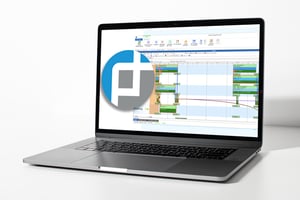Topics: Cost Reduction, Regulatory Compliance, PlanetTogether Software, Integrating PlanetTogether, Enhanced Demand Forecasting, Adaptive Capacity Planning, Flexibility and Scalability, Pharmaceutical Manufacturing
The role of a production scheduler is both critical and complex in pharmaceutical manufacturing. Faced with the challenges of fluctuating market demands, stringent regulatory requirements, and the pressing need for cost efficiency, production schedulers are increasingly turning to advanced technological solutions. Among these, the adoption of predictive analytics integrated with enterprise resource planning (ERP), supply chain management (SCM), and manufacturing execution systems (MES) has shown promising potential.
This blog explores how predictive analytics, when used in conjunction with tools like PlanetTogether and various ERP systems such as SAP, Oracle, Microsoft Dynamics, Kinaxis, Aveva, and others, can revolutionize demand forecasting and capacity planning in pharmaceutical manufacturing.

Pharmaceutical production schedulers are well-aware of the traditional challenges in the industry—from ensuring compliance with global regulations to managing complex supply chains and handling sensitive health-related products. However, the dynamic nature of health emergencies, like the COVID-19 pandemic, has underscored the need for more responsive and agile production systems. Predictive analytics offers a proactive approach, enabling manufacturers to anticipate demand fluctuations and adjust production schedules accordingly.

The integration of predictive analytics tools with ERP, SCM, and MES systems such as PlanetTogether, SAP, Oracle, or Microsoft Dynamics is a strategic move towards achieving a seamless flow of data across various segments of production. For instance, PlanetTogether’s advanced planning and scheduling (APS) software can be integrated with ERP systems like SAP or Oracle to enhance visibility and control over manufacturing operations. This integration facilitates the automation of data collection and analysis, allowing schedulers to make informed decisions based on real-time data.

Enhanced Demand Forecasting: By integrating predictive analytics with ERP systems, pharmaceutical companies can leverage historical data along with AI algorithms to predict future demand patterns more accurately. This capability is crucial in optimizing inventory levels and reducing waste.
Improved Capacity Planning: Predictive models can forecast production capacity needs based on upcoming demand and current facility constraints. This helps in preemptively addressing potential bottlenecks, thus ensuring smoother operations.
Cost Reduction: Better forecasting and planning lead to more efficient resource utilization, which in turn reduces costs associated with excess inventory, storage, and expedited shipping.
Regulatory Compliance: Predictive analytics can help ensure that production processes comply with regulatory standards by predicting and mitigating risks before they lead to compliance issues.
Scalability and Flexibility: As market conditions change, the systems can scale up or down and adjust production schedules without significant manual intervention.
As pharmaceutical companies continue to face volatile markets and complex production dynamics, the role of predictive analytics will only grow stronger. Integration with robust ERP systems like SAP, Oracle, and Microsoft, among others, will be key in harnessing the full potential of this technology.
Predictive analytics, when used in conjunction with tools like PlanetTogether and various ERP systems can revolutionize demand forecasting and capacity planning in pharmaceutical manufacturing.
Are you ready to take your manufacturing operations to the next level? Contact us today to learn more about how PlanetTogether can help you achieve your goals and drive success in your industry.
Topics: Cost Reduction, Regulatory Compliance, PlanetTogether Software, Integrating PlanetTogether, Enhanced Demand Forecasting, Adaptive Capacity Planning, Flexibility and Scalability, Pharmaceutical Manufacturing
0 Comments
No video selected
Select a video type in the sidebar.







LEAVE A COMMENT